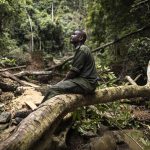
Sunday evening, 22 March, and President Cyril Ramaphosa made the announcement: South Africa was on a 21-day lockdown. The daily commute and face-to-face conversations with colleagues and beneficiaries were abruptly halted for many Africans in an effort to curb the disease on everybody’s mind – Covid 19. For a teacher at a rural school who relies on daily contact with learners and parents, this posed a challenge and – faced with a choice: am I going to be part of a proactive solution or sleep and count down the hours while aimlessly scrolling on social media on my iPhone (that is if I had one)?
Sindisiwe Tsheka lives in the rural village of Kantolo, in the poorest province of South Africa, the Eastern Cape. She has been confined to her home since 19 March. Sindisiwe had been supporting the elementary teachers at Kantolo Primary School by advising on how to implement Montessori principles in the classroom. Even during the lockdown, when no one is watching, Sindisiwe is a role model of proudly initiating projects. She had noted the teachers’ and parents’ needs in her community and decided to use this time to contribute to solutions. For example, safe, uncontaminated communal water resources are a necessity. So, she and her colleague, Hombakazi Mpetshwa, made a prototype of a tap out of a five litre plastic bottle to display for others to observe and copy. Statistics have also shown a sharp increase in domestic violence cases since the start of lockdown. Sindisiwe completed a webinar certificate on combating stress with art.
The teachers also realised that the lack of resources for outdoor play was a challenge. Sindiswe’s proactive solution was to make skipping ropes out of plastic shopping bags. Montessori philosophy stresses the importance of purposeful work. Children (and adults) find satisfaction in activities that challenge them beyond their zone of proximal development (Vygotsky). When children are not provided with the opportunity to follow their interests, choose and grapple with directive activities, they become frustrated and misunderstood as being “undisciplined” (Standing, 1998). Children are often labelled as naughty or thought to have a short attention span, when in fact all they need is work. Many of us might be experiencing the frustration of lack of purposeful activity during the lockdown. Work does not mean exclusively occupational, it is the activity, focusing energy into something with an outcome.
If you are feeling frustrated and lack the motivation to get out of bed in the morning to join the office Teams meeting, maybe it is time to follow your interest, find a task and immerse yourself in it. Become a child again and discover the wonder of work.
Reference: Standing, E.M. 1998, Maria Montessori, Her Life and Work, Penguin books, New York
Erica Burger is originally from Pretoria and comes from a family of educators. She has over ten years of teaching experience in a Montessori setting and simultaneously ran her remedial reading centre at Lynnwood Ridge Primary School. She was the principal of a Montessori school for three years. Erica has a passion for education development and taught in Mamelodi township before making a move, in 2016, to the rural Eastern Cape. As the Education Programmes Manager for Jabulani Rural Health Foundation, she facilitated accredited teacher training programmes, developed various ECD centres, a community home visit programme and afterschool centres. She moved to Cape Town in 2019 to manage the Year Beyond Youth Development Programme in collaboration with the Western Cape Government, Department of Sports and Culture. Erica was also a part-time lecturer at Montessori Early Learning Foundation. Erica is currently the Head of Programme: Child Development and Youth Formation at Good Governance Africa











